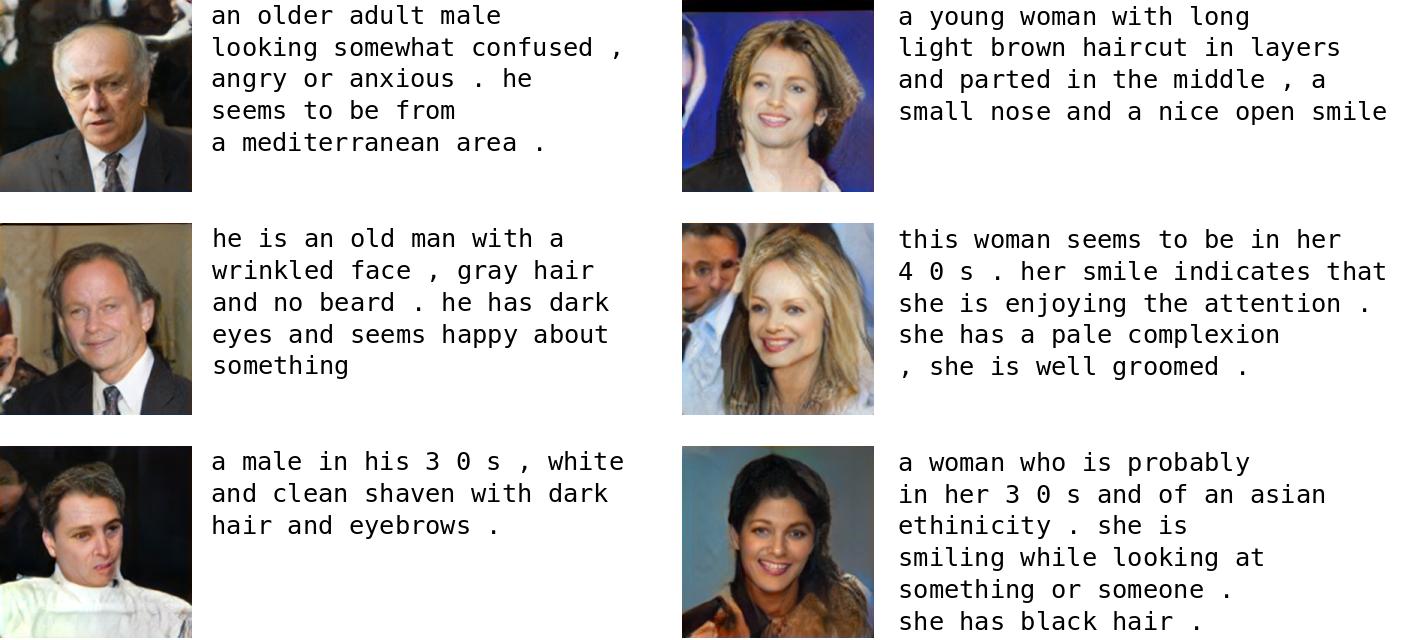Please head over to the following much cooler project that takes the idea of Text-2-Image generation to the next level:
Please note that all the faces in the above samples are generated ones. The T2F 2.0 will be using MSG-GAN for the image generation module instead of ProGAN. Please refer link for more info about MSG-GAN. This update to the repository will be comeing soon 👍.
Text-to-Face generation using Deep Learning. This project combines two of the recent architectures StackGAN and ProGAN for synthesizing faces from textual descriptions.
The project uses Face2Text dataset which contains 400 facial images and textual captions for each of them. The data can be obtained by contacting either the RIVAL group or the authors of the aforementioned paper.
The code is present in the implementation/ subdirectory. The implementation is done using the PyTorch framework. So, for running this code, please install PyTorch version 0.4.0 before continuing.
Code organization:
configs: contains the configuration files for training the network. (You can use any one, or create your own)
data_processing: package containing data processing and loading modules
networks: package contains network implementation
processed_annotations: directory stores output of running process_text_annotations.py script
process_text_annotations.py: processes the captions and stores output in processed_annotations/ directory. (no need to run this script; the pickle file is included in the repo.)
train_network.py: script for running the training the network
Sample configuration:
# All paths to different required data objects
images_dir: "../data/LFW/lfw"
processed_text_file: "processed_annotations/processed_text.pkl"
log_dir: "training_runs/11/losses/"
sample_dir: "training_runs/11/generated_samples/"
save_dir: "training_runs/11/saved_models/"
# Hyperparameters for the Model
captions_length: 100
img_dims:
- 64
- 64
# LSTM hyperparameters
embedding_size: 128
hidden_size: 256
num_layers: 3 # number of LSTM cells in the encoder network
# Conditioning Augmentation hyperparameters
ca_out_size: 178
# Pro GAN hyperparameters
depth: 5
latent_size: 256
learning_rate: 0.001
beta_1: 0
beta_2: 0
eps: 0.00000001
drift: 0.001
n_critic: 1
# Training hyperparameters:
epochs:
- 160
- 80
- 40
- 20
- 10
# % of epochs for fading in the new layer
fade_in_percentage:
- 85
- 85
- 85
- 85
- 85
batch_sizes:
- 16
- 16
- 16
- 16
- 16
num_workers: 3
feedback_factor: 7 # number of logs generated per epoch
checkpoint_factor: 2 # save the models after these many epochs
use_matching_aware_discriminator: True # use the matching aware discriminator
Use the requirements.txt to install all the dependencies for the project.
$ workon [your virtual environment]
$ pip install -r requirements.txt
Sample run:
$ mkdir training_runs
$ mkdir training_runs/generated_samples training_runs/losses training_runs/saved_models
$ train_network.py --config=configs/11.comf
blog: https://medium.com/@animeshsk3/t2f-text-to-face-generation-using-deep-learning-b3b6ba5a5a93
training_time_lapse video: https://www.youtube.com/watch?v=NO_l87rPDb8
ProGAN package (Seperate library): https://github.com/akanimax/pro_gan_pytorch
1.) Create a simple demo.py for running inference on the trained models


